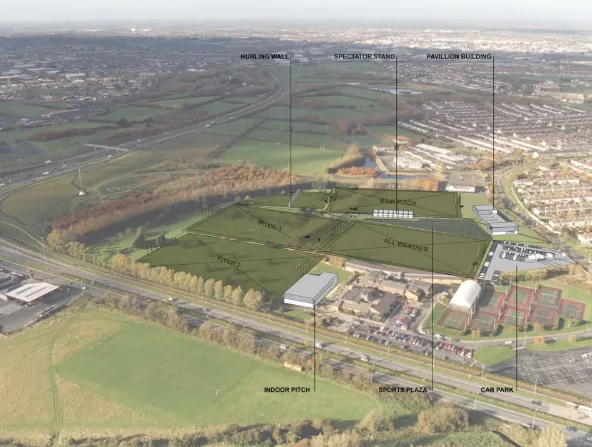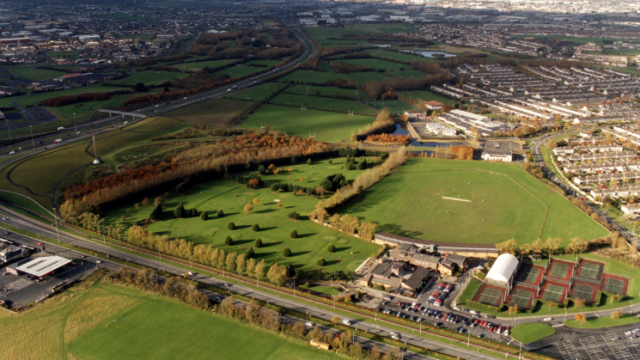Dublin GAA's County Board has been asked to revise its plans for a major new state-of-the-art training facility at the Spawell sports and leisure centre in south Dublin over concerns about its impact on the environment and traffic.
South Dublin County Council has postponed a decision on an application by Dublin GAA for planning permission for its proposed “cluster facility” just off the M50 in Templeogue in order to seek further information on the project.
The plans, which require the demolition of the existing golf driving range and the partial loss of indoor and outdoor soccer pitches, will provide three new floodlit GAA pitches, with electronic scoreboards and dugouts and an indoor training facility.
The project also involves the construction of a stand with seating for 500 spectators, and two uncovered seated terraces with capacity for another 500 spectators.
A new pavilion will include 10 team changing rooms, shower facilities, a dining room, a gym, a tuck shop, a meeting room, physio and first aid facilities, and a medical room.
A fourth pitch is already under construction on land which was formerly a pitch and putt course at the site.
Dublin GAA purchased the 13.8-hectare facility for over €9 million in 2017.

Other elements of the cluster facility include a large L-shaped hurling wall, running to 105 metres in length, and an all-weather surface sprint training area, as well as a 1.32km walking trail and jogging track, and car parking for 112 vehicles.
Dublin GAA has sought 10-year planning permission for the project on the basis it is an amateur, volunteer-based sporting organisation which will require extensive fundraising over a period of time to deliver the many elements of what it describes as “a high-end community focused active recreational facility for Gaelic games”.
However, council planners have asked the county board for further information on the project due to concerns over a number of aspects of its plans.
A planning report said the proposed removal of existing trees and an embankment along the site’s boundary with Wellington Lane is “unacceptable”.
The council said the relocation and possible redesign of the pavilion building, as well as an ESB substation, may be required in order to retain the existing boundary wall.
Council officials noted the retention of the mature trees and hedging on the boundary with Wellington Lane would also provide additional screening to reduce potential noise and light pollution from the proposed facility.
They also raised concerns that Dublin GAA may have underestimated the required level of parking spaces needed, which could result in vehicles parking in nearby housing estates.
The council has asked the county board for “a more robust analysis” of its traffic projections for the facility, in addition to a revised car park layout.
Serious concerns
Officials said they also had “serious concerns” about the potential of microplastics and other chemical pollutants from the astroturf pitches to pollute the River Dodder, as well as other issues relating to water management and drainage at the facility.
Additional information is also being sought in relation to the proposed electronic scoreboards.
Further details have been requested by the Department of Housing, Local Government and Heritage on the environmental impact of the development on wildlife, particularly bats and badgers, in the adjacent Tymon Park and the nearby River Dodder valley.
Department officials have also sought for an archaeological impact assessment of the site to be carried out.
A total of 63 third-party submissions were received by the council, including many from local GAA clubs which voiced strong support for the project, adding it would provide much needed training and match facilities.
However, concern was also raised by local residents about the scale of the development, particularly in relation to its ability to accommodate 1,000 spectators and associated parking and traffic issues.
They also raised questions over the potential for light and noise pollution from the proposed facility.
Some objectors also criticised the loss of golf and soccer facilities at the expense of Gaelic games.
The Spawell site was once proposed as the location for a 25,000-seater GAA stadium to host intercounty matches as a more suitable alternative to Croke Park for certain games.
Dublin GAA is also developing a similar centre of excellence on the city’s northside on a 9.3 hectare site at Hollystown Golf Course which it purchased in 2020. It was granted planning permission for the €6.6 million development in late 2022.
The county board said the plans for the Spawell site had emerged from a strategic plan published in 2012 which had identified a range of significant deficits in the physical infrastructure for the playing of Gaelic games in Dublin.







